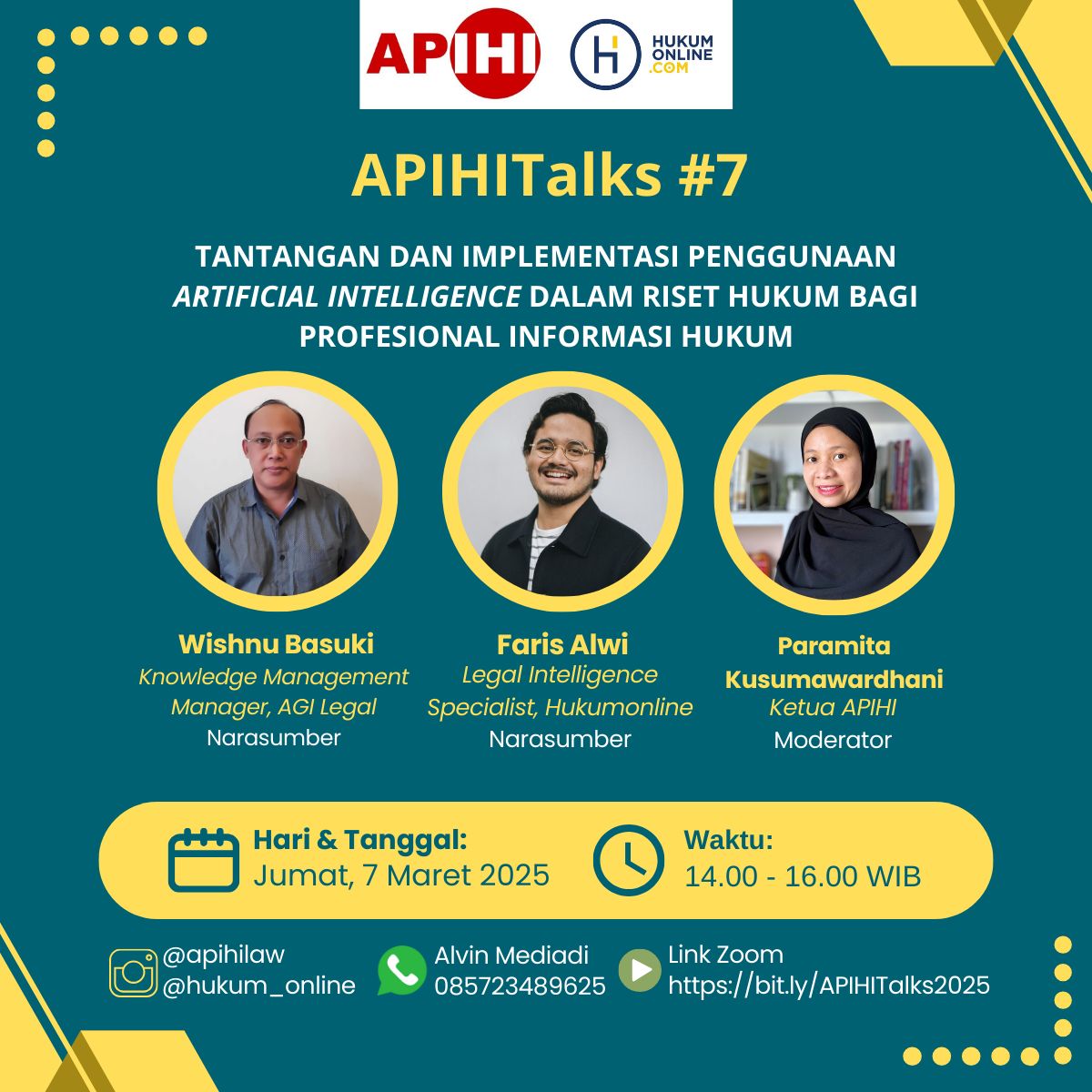Repost article from Challenges and Implementation of AI in Legal Research in Indonesia : Insights from APIHITalks #7 Webinar
Artificial intelligence (AI) is reshaping industries worldwide, and the legal field is no exception. While AI presents a game-changing opportunity in legal research, it also brings unique challenges. To dive deeper into this topic, Anggraeni and Partners team recently participated in APIHITalks #7 Webinar, which focused on the challenges and implementation of AI in legal research for legal information professionals.
This insightful session, organized by the Indonesian Association of Legal Information Professionals (APIHI) in collaboration with Hukumonline, brought together thought leaders, including Paramita Kusumawardhani (Chair of APIHI), Wisnu Basuki (Knowledge Management at AGI Legal), Faris Alwi (Legal Intelligence Specialist at Hukumonline), and Windianingrum (Knowledge Manager at Widyawan & Partners).
How AI is Transforming Legal Research?
Legal research is often time-consuming, requiring professionals to sift through vast amounts of legal texts, regulations, and case law. AI offers an innovative way to streamline this process by:
- Enhancing legal data processing by identifying and cross-referencing relevant statutes and precedents.
- Optimizing contract analysis and drafting to improve accuracy and reduce turnaround time.
- Automating legal research workflows to make case preparation and compliance checks more efficient.
However, as discussed in the webinar, AI should be viewed as a powerful tool rather than a replacement for legal professionals. While it can accelerate research, human oversight is essential to ensure accuracy, context, and reliability in legal interpretations.
Key Questions Raised in the Webinar
- How can legal information professionals fully leverage AI in legal research?
- What AI tools are most effective for legal consultants and knowledge managers?
- How can law firms support AI adoption to enhance legal information services?
Challenges of AI in Legal Research
- Understanding AI’s Limitations in Indonesian Legal Context
While global legal AI platforms like Lexis+ AI, Westlaw Edge, and Harvey AI are widely used, their applicability to Indonesian law remains limited. Many AI models struggle with local legal nuances, requiring further adaptation and human verification. - Ensuring Data Accuracy and Verification
To use AI effectively in legal research, professionals need to: - Ask strategic legal questions to get more accurate responses.
- Cross-check AI-generated results with trusted legal sources.
- Use multiple queries to test AI consistency and avoid misleading conclusions.
- Data Privacy, Bias, and Security Risks
AI is only as good as the data it is trained on. If the dataset contains bias or outdated legal information, AI could generate incorrect interpretations. Additionally, data privacy concerns arise when AI systems process confidential legal matters.
How Law Firms Can Embrace AI
Leading global firms are already integrating AI into their legal processes. For instance, Allen & Overy uses Harvey AI to improve efficiency in legal research and document drafting. Indonesian law firms can follow this trend by:
- Partnering with legal tech startups to develop AI-powered research tools.
- Hosting AI-focused Hackathons to innovate AI applications for the legal sector.
- Providing structured AI training programs to lawyers and legal researchers.
AI and the Future of Legal Practice
According to Faris Alwi from Hukumonline, AI is reshaping the legal sector in three significant ways:
- Automated Legal Document Generation → AI assists in drafting contracts and litigation documents.
- Process Optimization → AI automates repetitive legal tasks, freeing up time for strategic work.
- Advanced Legal Data Analytics → AI enables deeper insights into case law, regulations, and precedents.
In response to the demand for AI-driven legal research, Hukumonline has introduced Ailex, a regulatory-focused AI tool designed to assist legal professionals in navigating Indonesian law. However, as with all AI models, Ailex still requires human supervision and continuous updates to maintain accuracy.
Final Thoughts: AI as a Support System, Not a Replacement
The discussions reinforced that while AI can significantly improve legal research and document automation, it should not be blindly relied upon. Addressing accuracy, ethical considerations, and legal data limitations is critical to maximizing AI’s potential in the legal field.

Leave a Reply